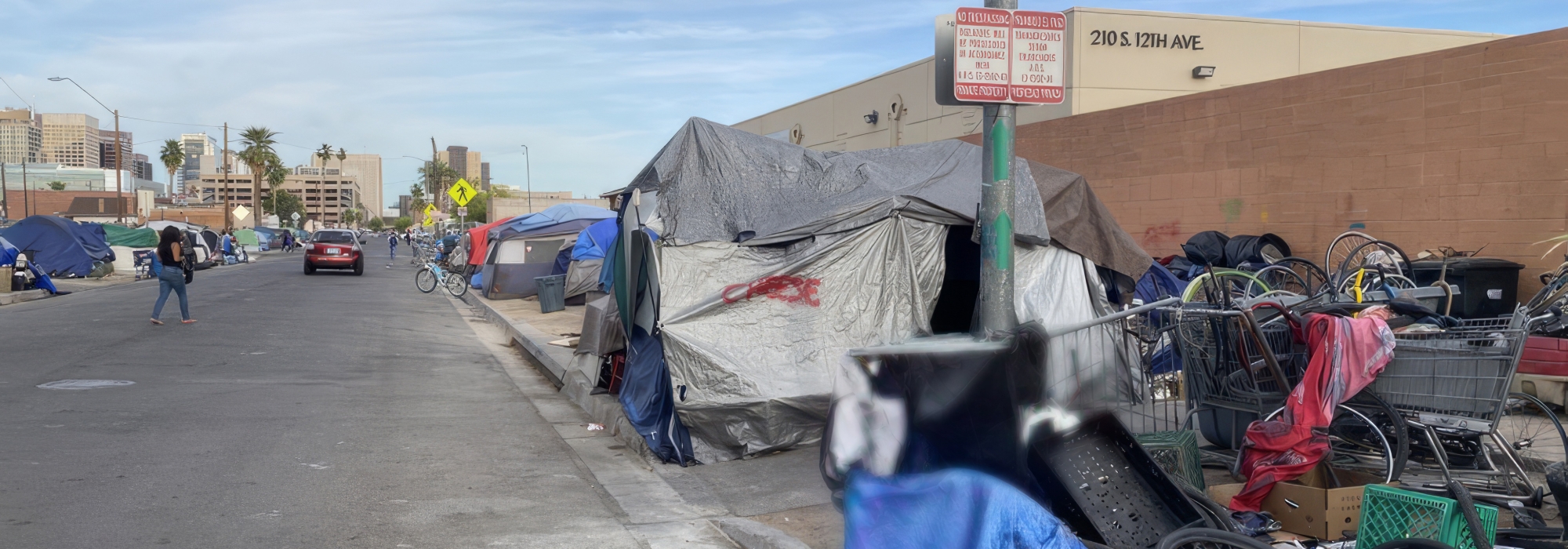
How effective is diversion and
outreach to prevent homelessness?
Richard Southee, Assistant Director of Programs Central Arizona Shelter Services (CASS)
Problem
Despite a 17-month eviction moratorium, evictions in Maricopa County increased by 22% from January 2020 to August 2022. With 50% of multifamily renter households and 30% of all households cost-burdened, there’s a growing risk of homelessness.
Research question
Is financial support effective in preventing homelessness, and how can clients who’ve received this aid be efficiently reached?
Background
Homeless prevention funding, which provides short-term financial assistance, is becoming a preferred strategy. While this approach seems promising, its true efficacy remains uncertain. Some studies indicate maintaining contact with recipients enhances success, but continuous outreach can be resource-intensive.
Research approach and findings
CASS offered financial aid to imminent or currently homeless individuals in Glendale over four months. Clients from the latter two months received periodic letters about available services. Over the six-month follow-up, 18% from the first cohort and 3% from the second cohort sought further assistance, though 24% of the second group had letters returned, indicating potential housing instability.
A total of 65 clients received services across the two cohorts (32 in Cohort 1, 33 in Cohort 2). With a total of 31 Black clients, 17 Hispanic, 13 White clients,, 2 Asian, and 2 Indigenous. Additionally, there was a total of 49 Female clients, 15 Male, and 1 Gender Non-Conforming client. Finally, client ages ranged from 20 to 76.
Implications
Diversion seems effective for 79% of recipients, though returned letters might suggest housing instability. It’s unclear whether address changes indicate ongoing instability or improved circumstances. Using letters to maintain contact might not be effective due to the changing addresses of this at-risk group.
Deliverable
We recommend further investigation into diversion’s effectiveness and alternative outreach methods. The inconclusive results suggest more research is needed before
heavily investing resources in this approach.
Richard Southee
Assistant Director of Programs Central Arizona Shelter Services (CASS)
Community Fellow, 2023
Richard Southee is the Assistant Director of Programs at Central Arizona Shelter Services, overseeing several of the programs CASS has throughout the valley to include a community outreach center in the City of Glendale and an emergency family shelter in the Sunnyslope Neighborhood in Phoenix. He is also a PhD Candidate at Arizona State University in the School of Human Evolution and Social Change in their Global Health Programs. As a homeless advocate, Richard's work and research centered on how trauma impacts service access decisions for people experiencing homelessness. He works to identify ways in which we can deliver efficient, outcome oriented solutions and while still being compassionate, human-centered, and trauma-informed in our work.
Richard has conducted workshops throughout Arizona on the topics of homelessness and trauma-informed care, and presented at both local and national conferences on trauma psychology, homeless services, and trauma-informed care, and aims to use his academic background to build cross-disciplinary partnerships that can create innovative solutions to the growing problem of homelessness. His research primarily implements linguistic methodologies such as discourse and conversational analysis to capture the unique ways in which people communicate their experiences, and to further understand cognitive decision-making processes. Richard has a Master's Degree in Linguistics & Applied Linguistics from Arizona State University, and Bachelor's Degrees in Arabic and in Linguistics from the University of Arizona.
